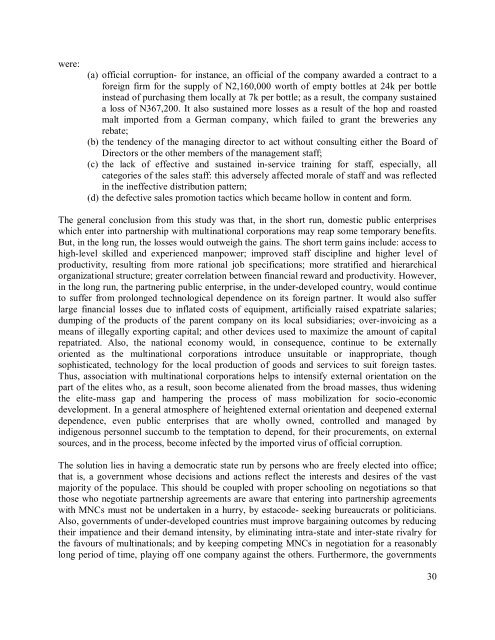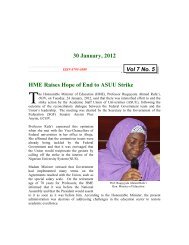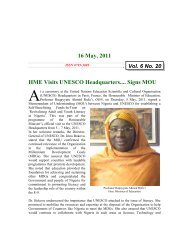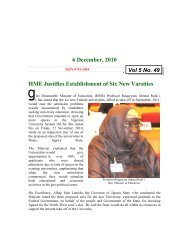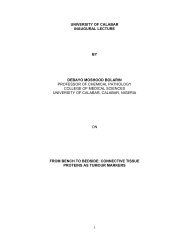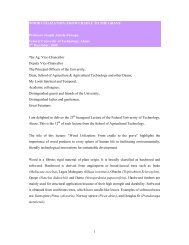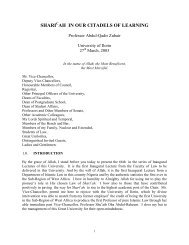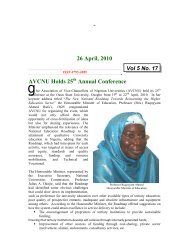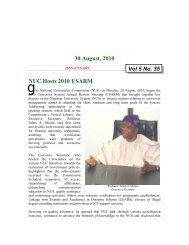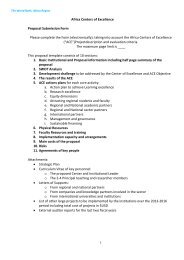From State And State Power To Man And Social - National ...
From State And State Power To Man And Social - National ...
From State And State Power To Man And Social - National ...
Create successful ePaper yourself
Turn your PDF publications into a flip-book with our unique Google optimized e-Paper software.
were:(a) official corruption- for instance, an official of the company awarded a contract to aforeign firm for the supply of N2,160,000 worth of empty bottles at 24k per bottleinstead of purchasing them locally at 7k per bottle; as a result, the company sustaineda loss of N367,200. It also sustained more losses as a result of the hop and roastedmalt imported from a German company, which failed to grant the breweries anyrebate;(b) the tendency of the managing director to act without consulting either the Board ofDirectors or the other members of the management staff;(c) the lack of effective and sustained in-service training for staff, especially, allcategories of the sales staff: this adversely affected morale of staff and was reflectedin the ineffective distribution pattern;(d) the defective sales promotion tactics which became hollow in content and form.The general conclusion from this study was that, in the short run, domestic public enterpriseswhich enter into partnership with multinational corporations may reap some temporary benefits.But, in the long run, the losses would outweigh the gains. The short term gains include: access tohigh-level skilled and experienced manpower; improved staff discipline and higher level ofproductivity, resulting from more rational job specifications; more stratified and hierarchicalorganizational structure; greater correlation between financial reward and productivity. However,in the long run, the partnering public enterprise, in the under-developed country, would continueto suffer from prolonged technological dependence on its foreign partner. It would also sufferlarge financial losses due to inflated costs of equipment, artificially raised expatriate salaries;dumping of the products of the parent company on its local subsidiaries; over-invoicing as ameans of illegally exporting capital; and other devices used to maximize the amount of capitalrepatriated. Also, the national economy would, in consequence, continue to be externallyoriented as the multinational corporations introduce unsuitable or inappropriate, thoughsophisticated, technology for the local production of goods and services to suit foreign tastes.Thus, association with multinational corporations helps to intensify external orientation on thepart of the elites who, as a result, soon become alienated from the broad masses, thus wideningthe elite-mass gap and hampering the process of mass mobilization for socio-economicdevelopment. In a general atmosphere of heightened external orientation and deepened externaldependence, even public enterprises that are wholly owned, controlled and managed byindigenous personnel succumb to the temptation to depend, for their procurements, on externalsources, and in the process, become infected by the imported virus of official corruption.The solution lies in having a democratic state run by persons who are freely elected into office;that is, a government whose decisions and actions reflect the interests and desires of the vastmajority of the populace. This should be coupled with proper schooling on negotiations so thatthose who negotiate partnership agreements are aware that entering into partnership agreementswith MNCs must not be undertaken in a hurry, by estacode- seeking bureaucrats or politicians.Also, governments of under-developed countries must improve bargaining outcomes by reducingtheir impatience and their demand intensity, by eliminating intra-state and inter-state rivalry forthe favours of multinationals; and by keeping competing MNCs in negotiation for a reasonablylong period of time, playing off one company against the others. Furthermore, the governments30


